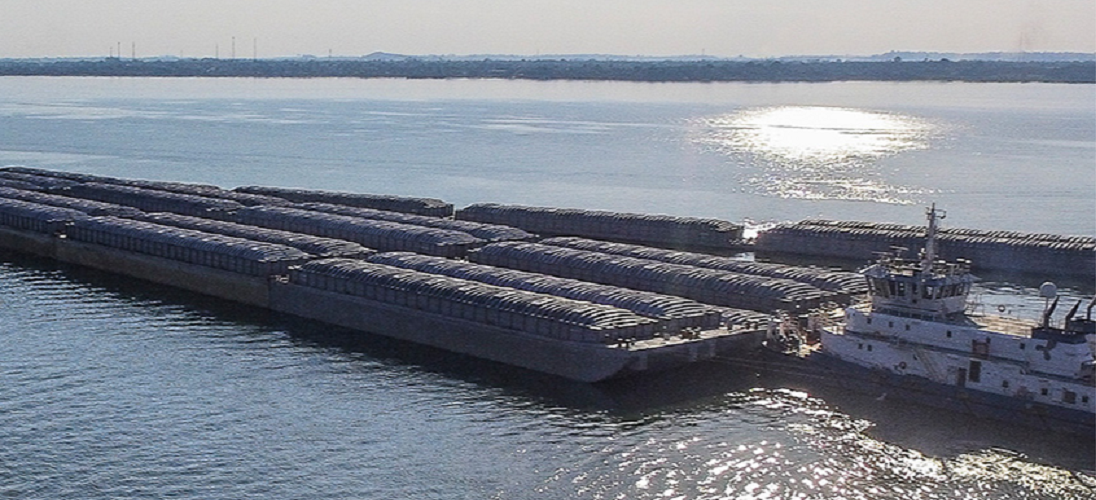
Hidrovias do Brasil seeks recovery path in 2022
Apr, 22, 2022 Posted by Gabriel MalheirosWeek 202217
After a ‘perfect storm’ last year, Hidrovias do Brasil‘s main goal is to return to normalcy in 2022, lower its leverage, and demonstrate to the market that the shocks suffered are far behind.
In 2021, the company dealt with a series of problems, including corn crop failures that lowered yields in the Arco Norte region and a water crisis that caused transportation of the Paraná-Paraguay river to be disrupted. Moreover, on the financial front, the rise in the value of the dollar increased the group’s indebtedness. As a result, the company finished the year with a leverage of 6.5 times net debt divided by adjusted Ebitda.
According to president Fabio Schettino, the forecast for this year is that these effects will not repeat, which should already show up in the first quarter’s results. The volumes of harvested grains are expected to increase. Concerning the water crisis, he claims that the climatic conditions have improved; thus, the drought shall remain in the past.
“We are in full recovery, the situation is still not entirely normal, but it is much better. We have 15 convoys in operation. Last year, in August and September, we had none. We can currently say that this is not to be repeated in the second half of the year because the Pantanal region is full, much higher than it was at this time in 2021.”
When asked about the effects of deforestation and climate change on the operation, Schettino said that the company commissioned a study to analyze long-term consequences. “I’m less concerned about the short term and more concerned about the long term, not just for Hidrovias do Brasil, but for all navigation and agriculture.” It is a universal concern. “Weather patterns don’t alter overnight, especially in large-magnitude watersheds like the ones we work in,” he says.
With an expected growth in Ebitda and a fall in the dollar, leverage is expected to be reduced to roughly 4.5 times by the end of this year, a level similar to that reported at the end of 2020.
According to the executive, indebtedness is not a worry because most maturities will not occur until 2031. As a result, the group had a net debt of R$ 4.6 billion in 2021. Ebitda was R$427.6 million for the year, and adjusted Ebitda (after non-recurring events and hedge accounting) was R$630.2 million.
While its financial balance remains pressured, the company will focus investments on initiatives that bring quick returns. Among them is the acquisition of two tugboats, which should expand the company’s capacity in Arco Norte from the current 7 million to around 8 million tons starting next year.
In addition, the group plans to start operating the fertilizer and salt terminal in the Port of Santos in August. The terminal’s capacity will reach 2.5 million tons – a level that the company should get in 18 to 24 months of operation.
The following steps for the company’s expansion are still being discussed. The idea is to approve a new plan by July. The group expects to reach Ebitda from R$ 1.35 billion to R$ 1.5 billion in 2025. Schettino says that while this projection remains valid, the question is how to get there.
The company will focus on the creation of new routes in Arco Norte. One has already started being implemented: the waterway route between Porto Velho and Santarém (PA) or Itacoatiara (AM). The company wants to incorporate this corridor into its operation, which grain trading companies already use.
To achieve this, the company is preparing a terminal in Porto Velho. In addition, the enterprise is under environmental licensing, a process that should extend until mid-2023. Another potential route is between Juruti (PA) and São Luis for the transport of bauxite – however, for this route, there is still nothing concrete.
In addition, more towards the south, the executive points out the potential to capture cargo from new mining companies that are being installed in Mato Grosso do Sul. “Today, Vale reigns alone, but other projects are starting to become more viable with the rise in mineral ore prices,” he says.
Source: Valor Econômico
To read the full original article, please go to:
-
Economy
Jul, 11, 2023
0
Brazilian exports show 10.4% year-on-year increase by 1st week of July
-
Meat
Mar, 10, 2022
0
Beef: Argentine exports grew 24.6% in January
-
Other Cargo
Sep, 18, 2023
0
Brazilian footwear: 20 years of growing exports to Arabs
-
Meat
Aug, 06, 2024
0
Argentine government lowers beef export tax to 6.75%



